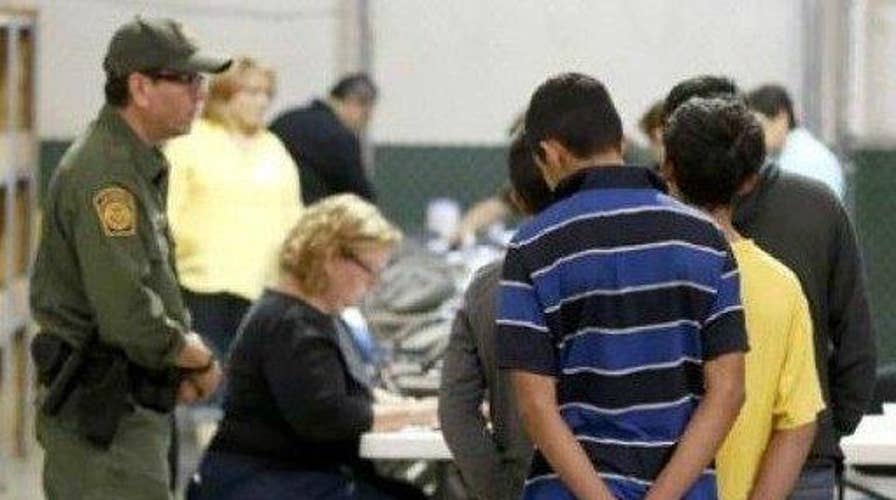Immigration enforcement is way up in US cities
Critics say policies expose non-criminal illegal immigrants
A contingent of the Congressional Hispanic Caucus, led my Chairwoman Michelle Lujan Grisham, D-N.M. will travel to Tijuana, Mexico Saturday to speak with a group of deported veterans in hopes of streamlining the pathway to citizenship for non-citizens who have served in the U.S. military.
There are an estimated 230 non-U.S. citizen veterans who have been deported, according to a 2016 report by The American Civil Liberties Union.
“We need to do more than just promise veterans a fast track to citizenship after their military service,” said Lujan Grisham. “We need to do everything possible to help them apply, while also supporting them and their families to the highest degree possible.”
Representatives Joaquin Castro, D-Texas, Lou Correa , D-Calif., Vicente Gonzalez, D-Texas, D-Texas, Raul Grijalva, D-Ariz., Juan Vargas, D-Calif., and Nanette Diaz Barragán, D-Calif., will accompany Lujan to meet with 20-30 deported veterans and family members at the Deported Veterans Support House in Tijuana.
“Many lawful permanent resident service members are told by recruiters that they can quickly gain citizenship for themselves and their family after serving honorably,” said Lujan Grisham. “However, they are not advised that citizenship is not granted automatically and that they must actively seek citizenship through the standard, although expedited, application process.”
What the representatives hope to learn are the actual reasons why the veterans were deported and how they can be assisted.
A spokeswoman for Grijalva said it can range from the complicated immigration system and process to minor or even significant offenses.
A pathway towards citizenship does exist and like other immigration issues, requires administrative compliance and patience on the part of the applicant.
“The process of becoming a citizen is voluntary and controlled by USCIS,” said Lt. Col. Myles Caggins, spokesman, Department of Defense. “Not all vets choose to become citizens.”
U.S. Citizenship and Immigration Services offers a generous pathway for veteran immigrants to receive legal citizenship, especially if the veteran served in combat. But as Caggins said, not all choose to take advantage of the opportunity. This could then put their legal status in jeopardy.
According to the USCIS website, a person who has served honorably in the U.S. armed forces at any time may be eligible to apply for naturalization under section 328 of the INA. The military community sometimes refers to this as “peacetime naturalization.” And for those who serve in an area of hostilities, for any period of time, even one day, during specifically designated periods of hostilities are eligible for naturalization under section 329 of the INA through such military service.
The process is surprisingly simple but does require an application process. Every military installation has a designated point-of-contact, generally in the personnel division or the Judge Advocate General’s office, who can assist in the application process.
Once the application has been received, the National Benefits Center will review the application and send it to the USCIS office closest to the veteran’s location. The USCIS office will set a date to interview the veteran to determine eligibility for naturalization. If the application for naturalization is approved, USCIS will provide a date to take the oath of allegiance.
According to an ICE official, nearly all U.S. military vets who get removed failed to follow through on the citizenship process available to them.
“If they are granted citizenship, then we don’t remove them unless they are denaturalized, which is significant and usually the result of a serious criminal conviction or major fraud somewhere along the process,” said the official. “Veterans have all the same available legal process (immigration proceeding and appeals) that anyone else here illegally has available as well.”
The official added that any action taken by ICE that may result in the removal of an individual with military service must be authorized by the senior leadership in a field office, following an evaluation by local counsel.
“ICE exercises prosecutorial discretion for members of the armed forces who have honorably served our country on a case-by-case basis when appropriate,” said the ICE official. “ICE specifically identifies service in the U.S. military as a positive factor that should be considered along with other factors in the totality of the circumstances when deciding whether or not prosecutorial discretion should be exercised. Still, applicable law requires ICE to mandatorily detain and process for removal individuals who have been convicted of aggravated felonies as defined under the Immigration and Nationality Act.”
As of March 2017, there were 11,349 non-U.S. citizens serving on active duty in the military. More than 100,000 service members have obtained citizenship through these programs. In the first quarter of FY 2017, UCIS received 1,566 military naturalization requests and approved 1,485.
The greatest numbers of lawful permanent resident service members come from the Philippines, Mexico, Jamaica, South Korea, and the Dominican Republic. Overall, there are about 608,000 foreign-born veterans of the U.S. armed forces from nations around the world.





